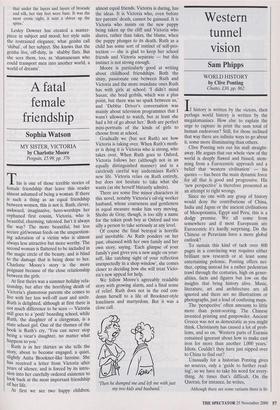A fatal female friendship
Sophia Watson
MY SISTER, VICTORIA by Charlotte Moore Penguin, £5.99, pp. 376 -■■•■1 This is one of those terrible stories of female friendship that leave this reader almost ashamed of being a woman. If there is such a thing as an equal friendship between women, this is not it. Ruth, clever, awkward, imaginative, hero-worships her orphaned first cousin, Victoria, who is beautiful, charming, talented. Isn't it always the way? The more beautiful, but less secure girl/woman feeds on the unquestion- ing adoration of a victim who is almost always less attractive but more worthy. The second woman is flattered to be included in the magic circle of the beauty, and is blind to the damage that is being done to her. Charlotte Moore's story is the more poignant because of the close relationship between the girls.
At first theirs was a summer holiday rela- tionship, but after the horrifying death of Victoria's glamorous parents she comes to live with her less well-off aunt and uncle. Ruth is delighted, although at first there is not much difference to be seen — Victoria still goes to a 'posh' boarding school, while Ruth, the daughter of a clergyman, is a state school girl. One of the themes of the book is Ruth's cry, 'You can never stop being a vicar's daughter, no matter what happens to you.' Ruth is in her thirties as she tells the story, about to become engaged, a quiet, slightly Anita Brookner-like heroine. She has received a letter from Victoria after Years of silence, and is forced by its intru- sion into her carefully ordered existence to look back at the most important friendship of her life.
At first we see two happy children, almost equal friends. Victoria is daring, has the ideas. It is Victoria who, even before her parents' death, cannot be gainsaid. It is Victoria who insists on the new puppy being taken up the cliff and Victoria who shares, rather than takes, the blame, when the puppy plunges to its death. Ruth as a child has some sort of instinct of self-pro- tection — she is glad to keep her school friends and Victoria separate — but this instinct is not strong enough.
Moore is particularly good at writing about childhood friendships. Both the shiny, passionate one between Ruth and Victoria and the more mundane ones Ruth has with girls at school: 'I didn't mind Susan; she bred gerbils, which was a plus point, but there was no spark between us,' and 'Debbie Driver's conversation was mainly about television programmes that I wasn't allowed to watch, but at least she had a bit of go about her.' Both are perfect mini-portraits of the kinds of girls to choose from at school.
Gradually we (but not Ruth) see how Victoria is taking over. When Ruth's moth- er is dying it is Victoria who is strong, who takes over. When Ruth goes to Oxford, Victoria follows her (although not in an equally distinguished manner) and in a carelessly careful way undermines Ruth's new life. Victoria relies on Ruth entirely, but does not hesitate to take what she wants (as she herself blatantly admits).
There are some fine minor characters in this novel, notably Victoria's oil-rig worker husband, whose coarseness and gentleness in equal measure make him very moving. Sholto de Gray, though, is too silly a name for the token posh boy at Oxford and too silly a person to take seriously at any level.
Of course the final betrayal is horrific and inevitable. As Ruth ponders on her past, obsessed with her own family and her own story, saying, 'Each glimpse of your family's past gives you a new angle on your- self, like catching sight of your reflection unexpectedly in a shop window', she comes closer to deciding how she will treat Victo- ria's new appeal for help.
We follow Moore's agreeably readable story with growing alarm, and a final sense of relief. Ruth does not in the end con- demn herself to a life of Brookner-style loneliness and martyrdom. But it was a close call.
`Then he dumped me and left me with just my two kids and husband.'





























































































 Previous page
Previous page